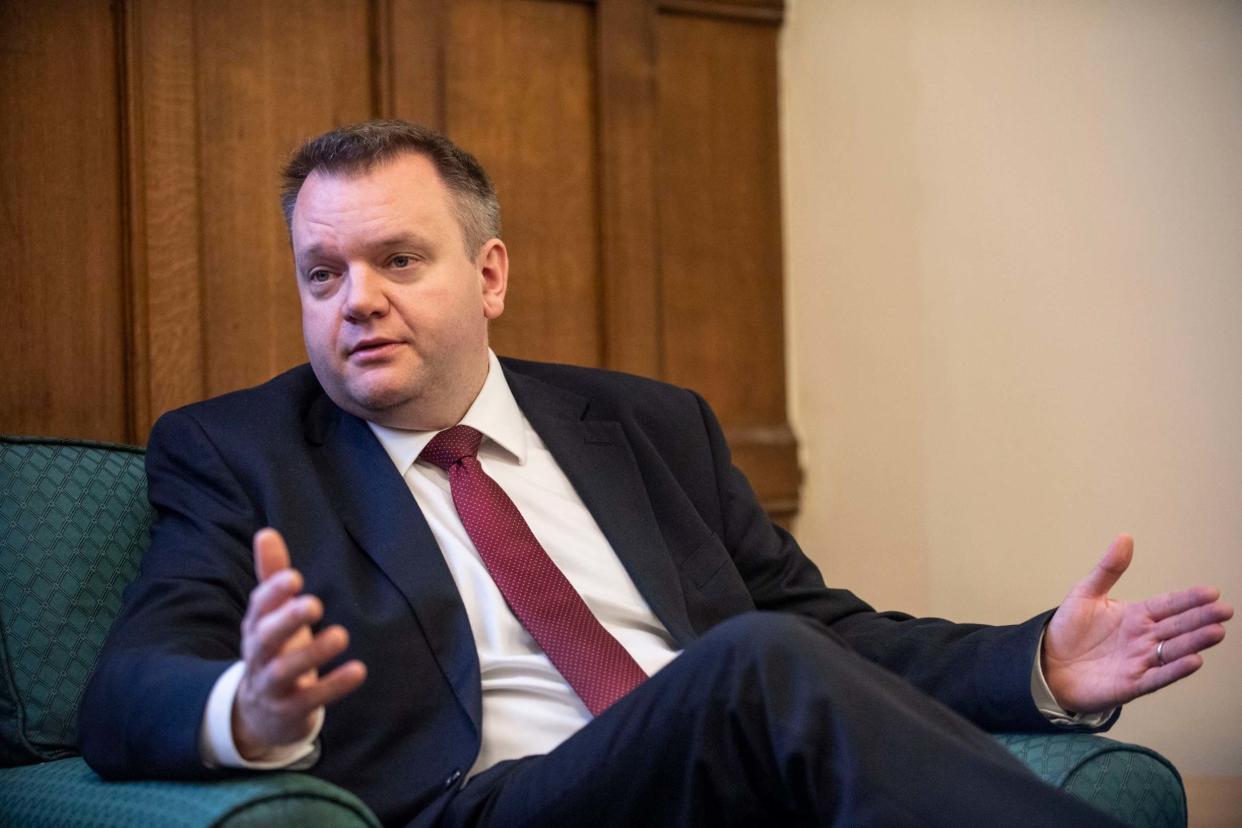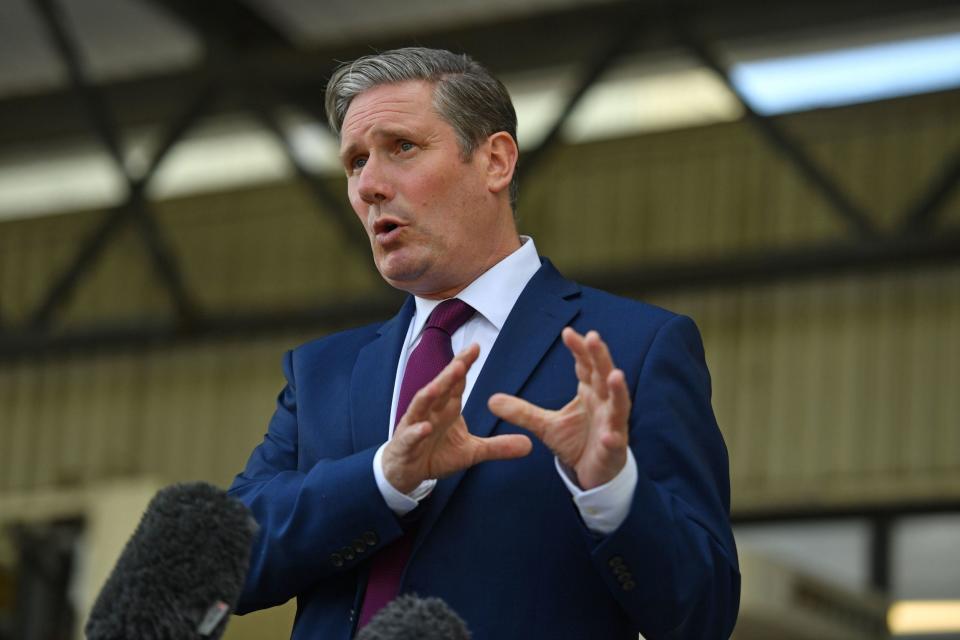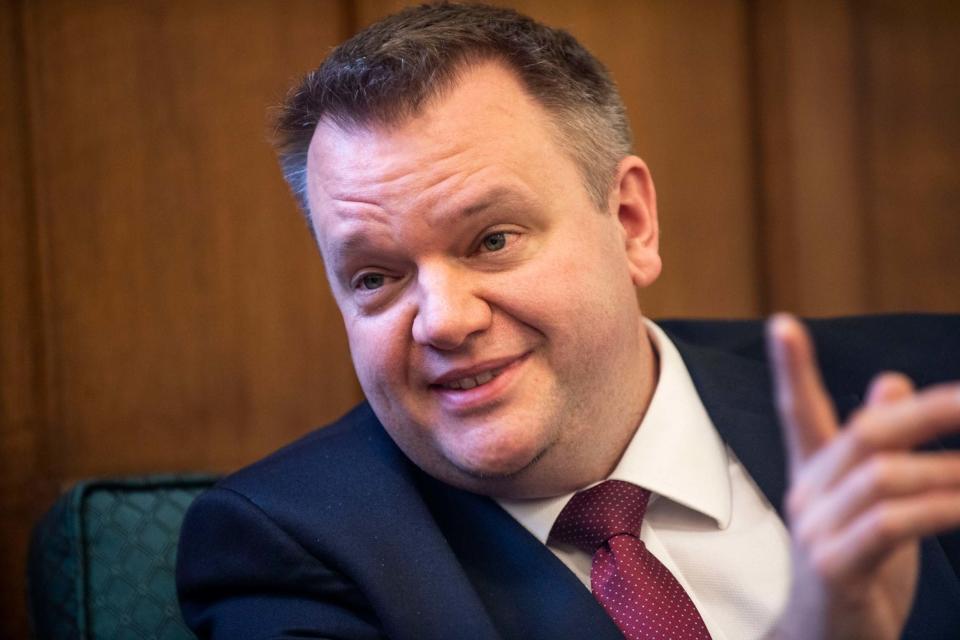Nick Thomas-Symonds: Meet the shadow home secretary helping Sir Keir Starmer rise up

The thing about Nick Thomas-Symonds is that he is very nice. Open-faced and friendly, he is married to his childhood sweetheart and still lives in the village he grew up in.
At Westminster he is noted for asking tough, detailed questions, but not for personal attacks. And when Sir Keir Starmer was elected Labour leader in April, one of his first acts was to promote the genial Welsh lawyer to shadow home secretary, one of the most sensitive posts in shadow cabinet.
Locating skeletons in Thomas-Symonds’ closet is a struggle. Has he ever taken illegal drugs? “No.” When was the last time he broke the Rule of Law in any way? “I’m trying to think of an example,” he says screwing up his eyes. “I can’t off the top of my head.” Not even speeding? Finally he fesses up. “Actually, many years ago I was caught speeding. I ended up on a speed awareness course.”
Being nice is all very well, but in politics, as Boris Johnson knows, sometimes it is the risk-taker and ruthless attacker who wears the crown. This weekend is Labour’s annual party conference – a “virtual conference” staged online due to Covid restrictions — and its best chance to disprove one of the Prime Minister’s favourite attack lines at Starmer’s opposition, which is that Labour are just “carping from the sidelines” and avoiding the hard choices that denote a government-in-waiting.

A key theme, Thomas-Symonds reveals, will be “jobs, jobs, jobs”, in particular the looming cut-off of the furlough scheme. Another will be spotlighting the failings in the Government’s testing and tracing programme. “Obviously, everything relates back to coronavirus,” he said. And he will be castigating Priti Patel, the Home Secretary, over violent crime. Thomas-Symonds has discovered from written answers that the Government’s much trumpeted Serious Violence Taskforce has failed to meet for over a year. This is despite a 16 per cent increase in homicides involving a knife in the past decade, and warnings that domestic violence surged during lockdown.
“The Home Secretary desperately needs to get a grip,” he says. “This problem needs senior ministers and the PM saying at the highest level ‘something has to be done about this’. We need a grip across government because that’s the only way you drive change.”
In his main speech to conference, he will reflect on the Attlee government of 1945 and how its values can be applied to the modern world. He has a historian’s expertise on the post-war era, having written well-received biographies of Clement Attlee and his own political hero, Nye Bevan, founder of the NHS. A third volume is on the way about Harold Wilson, “an underrated figure”.
He sees a parallel between 1945 and Covid-19. “There was this great collective sacrifice in World War II. It was person against person, nation against nation. Now there is a very different sacrifice, about a virus that is challenging the whole of humanity,” he says. “Attlee and Bevan argued that things could not go back to how they were before, and that’s the argument I will be making very strongly again.”

So far, everything he has said is firmly in Labour’s comfort zone, and it remains to be seen whether there will be a drama next week to match Tony Blair’s announcement at his first conference that he wanted to abolish Clause 4. Does he ever listen to advice from Tony Blair or Gordon Brown? “I speak to both of them and they are both extremely ready to give advice,” he reveals.
Nicklaus Thomas-Symonds was born in 1980, the son of steelmaker Jeff Symonds and secretary Pat Thomas. His childhood was set amid the remnants of Welsh heavy industry whose decline “laid waste to the talents of so many people in the valley I grew up in”. His political epiphany came from his grandmother, Olwyn, who went into service at 16 but achieved her life ambition to become a nurse at 56. “She said to me, ‘it’s all very well talking about it, but the only way you can change it is through politics.’”
His father, who had “a phenomenal memory”, retrained in mid-career to become an industrial chemist. “He literally would work his shift, go to night school, double back, do more shifts.” His father’s love of golf explains the unusual spelling of his first name, after Jack Nicklaus. He won a place at Oxford and achieved a first in PPE. He eschewed student politics, but during holidays steeped himself in the Labour Party back home in Wales. At 16, he met Rebecca, his future wife and mother of their three children, when they were on rival teams in a school debate. He was MP for Torfaen by 34.
He is clearly at home in Labour’s heartland, but the big question is whether his law and order approach, which he defines as “compassion with competence”, can cut through to voters in, say, Mansfield, a former Red Wall seat that now has a Tory MP. “I strongly believe so. Take crime. Whether you go to Torfaen, Tottenham or Telford, you will find people wanting the same thing.” What about immigration, an issue the Conservative are certain to spotlight in 2024? What would he do about migrants crossing the Channel in dinghies? Thomas-Symonds lists working with the French authorities, expanding the Dubs scheme for refugee children, investigating “why are people fleeing their homes”.
Would that mean more or fewer migrants from French camps getting to the UK? He ducks the choice, arguing that getting into specific numbers “created huge problems” when David Cameron pledged to cut net immigration to tens of thousands. What about free movement, which Starmer promised in January to restore? Will that be an election pledge? Thomas-Symonds says the ability to travel will be part of Labour’s offer but is hazy, saying: “Precisely the details of our immigration policy we will set out at the time.”
Pragmatism and a moral tone run through his views. He was “very distressed” when Labour MP Dawn Butler was stopped by police in a car. “Any allegations of racial profiling have to be taken extremely seriously,” he says. On stop and search, he prefers it to be “evidence based” and for intense Section 60 searches to be used “sparingly”. He backs the “Rule of Six” and does not dismiss shopping his neighbour if they broke the rules. “If there’s a huge party of inappropriate behaviour, yes, of course I would.” He bats away the issue of whether children under 12 should be exempted with the stock answer: “Let’s keep it under review”.Should Prince Andrew obey the request to giveevidence in the United States about his former friend, the paedophile Jeffrey Epstein. “If there is a particular request — my broad principle answer would be everybody’s equal under the law.”
He and Starmer clearly get on. They bonded over “stacks of amendments” in the Brexit battles. Asked what he admires about Starmer, he says a “burning sense of tackling injustices” and “allied to that, this real sense of detail and forensic brain”.
Some seasoned Labour MPs are talking him up as Labour’s next Chancellor, seeing him as more authoritative than Anneliese Dodds. On this, Thomas-Symonds is absolutely clear, saying: “I want to be the Home Secretary. That’s my mission.”
Read more
Angela brings a 'touch of class' in PMQs battle against Boris


